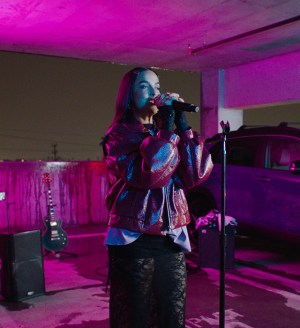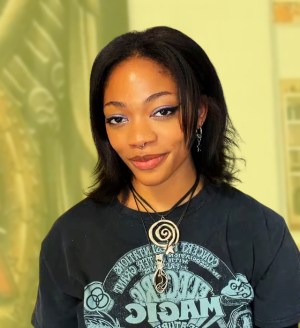Music + Culture
SHOWS
Covers Books
EVENTS
FEATURED
BRANDS
TRAVEL,
DRINKS & EATS
DRINKS & EATS
Latest
BTS Just Announced A Year-Long Comeback Tour Launching Very Soon
Earlier this month, BTS gave their fans some long-awaited news: After years away fulling military service obligations in South Korea, the group is coming back with an album and a tour in 2026. Details provided at the time were sparse, but now the BTS has announced tour dates for this year and next. It kicks off in South Korea and Japan before making its way to North America in April. Venues for a lot of the shows are listed as "TBD," but the North American ones are all revealed now. Among the highlights are four nights at Los Angeles' SoFi…
Mary J. Blige Is Sharing ‘My Life, My Story’ In A New Las Vegas Residency Launching Soon
In recent years, Las Vegas residencies have become increasingly popular among artists at various points in their careers. After all, it's like a tour minus all that pesky traveling. Plus, being in the same venue for every show can make it easier to keep the production consistent. Now, Mary J. Blige is getting in on the action, as yesterday (January 12), she announced Mary J. Blige: My Life, My Story The Las Vegas Residency. She says in a statement: “I’ve been so excited to announce this Vegas residency. Creating a show like this has been something I’ve always wanted to…
The Game Returns With Legendary Energy
The Game has never chased moments -- he's created movements. For more than two decades, the Compton rapper has treated hip-hop as an album-driven art form, rooted in authenticity, lineage, and lived experience. With Every Movie Needs A Trailer, a Gangsta Grillz collaboration alongside acclaimed producers Mike & Keys and mixtape king DJ Drama, Game isn't teasing nostalgia -- he's setting the stage for what comes next. Soulful but sharp, reflective yet defiant, the project feels like a veteran artist locking back into purpose. Thankfully, I gave The Game a few magazine covers back in the day, so he was…
Harry Styles Is Teasing Something As Fans Wait For A New Album
The last time we got a new Harry Styles album was in 2022 with Harry's House. Since that and the supporting Love On Tour, Styles has largely remained out the public eye (aside from random sightings like Pope Leo's introduction at the Vatican and marathons in Japan and Germany). Before 2025 came to an end, he unexpectedly shared a video from the aforementioned tour, sparking hope that Styles was generating attention for a reason. Mysteriously, Styles does appear to be teasing something on the way. Some promotional posters have been spotted around the world, with differing messages like "see you…
ASAP Rocky Unveils His Chaotic And Impressive New ‘Helicopter’ Video
It has been a long time coming for ASAP Rocky's new album Don't Be Dumb. It was supposedly finished in 2022. Then there was delay after delay after delay. Finally, though, it's coming: The project is set to drop this Friday, January 16. That's just days away, but before the release, Rocky has hyped it up today (January 12) with a new song, "Helicopter," and a video for the track. The video is a winner, a rapid-fire and surreal look at various scenes during a riot. Throughout, Rocky raps the song as he practices boxing, flies in a helicopter, and…
Sombr Turns In A Powerful Piano Cover Of Phoebe Bridgers’ ‘Motion Sickness’
After emerging as one of 2025's biggest breakout stars, Sombr's 2026 is off to a good start. Over the weekend, he dropped by BBC Radio 1 for a "Piano Sessions" performance. For his song, he, joined by a pianist, decided to sing a stirring rendition of Phoebe Bridgers' "Motion Sickness." It wasn't a surprising selection, as Sombr is a big Bridgers fan. In a recent interview, Sombr was asked about his favorite artists and he said, "Radiohead, Phoebe Bridgers, Bon Iver, The 1975, and obviously Sombr." He later said during the same chat, "I hope to collab with other artists…
Zach Bryan Unveils ‘Plastic Cigarette’ And Teases An Acoustic Version Of His New Album ‘With Heaven On Top’
Zach Bryan is at the start of a big year. In March, he launches a tour that will keep him sporadically busy until October. His new album With Heaven On Top is also set to drop tomorrow (January 10). Ahead of that, we have "Plastic Cigarette," what will presumably be the final taste of the album before its release. In an Instagram post from today, Bryan wrote of the album: "'With Heaven on Top' is a collection of songs my band and me recorded across three different houses in Oklahoma this winter. The cool air kept us all inside staggering…
GALE Takes Her Next Hit On The Road With Toyota In ‘The Sonic Route’
What does Latin pop music’s biggest breakout do when she’s just mixed her next hit, and she can’t wait to share it with her biggest fans? She takes it on the road… literally. The Sonic Route, UPROXX’s new team up with Toyota, follows Latin GRAMMY winner GALE as she cruises around Los Angeles, planning an exclusive surprise performance of her newest track, “Mi Tienes.” To pull it off, she's going to need the right team and the right car, utilizing the 2026 Toyota Corolla Cross Hybrid XSE as a rolling hub and showing that a good ride with your team…
Bruno Mars Is Finally Back With The Funky And Groovy New Single ‘I Just Might’
It's happening: This week, Bruno Mars announced a new album, The Romantic, and a big tour for 2026. At the time, he promised new music would arrive today (January 9), and now it has as Mars shares the video for "I Just Might." It's a classic Mars number: Catchy and carried by a throwback funky and soulful vibe. He also has fun in the video, featuring a bunch of different versions of himself dancing and playing the song. On his upcoming tour, he'll be joined by Silk Sonic partner Anderson .Paak (as DJ Pee .Wee), Leon Thomas, Victoria Monét, and…
Twenty One Pilots Captured Their Massive Mexico City Concert For An IMAX Concert Film, ‘More Than We Ever Imagined’
We are approaching 20 years of Twenty One Pilots and the duo remains huge: Their 2025 album Breach went No. 1 on the Billboard 200 chart, making it their second chart-topper and fifth to peak at at least No. 3. The band remains a touring force, too, as they showed on The Clancy World Tour last year. They decided to capture their Mexico City performance, in front of 65,000 fans, for More Than We Ever Imagined, a new IMAX concert film. It's set to hit IMAX cinemas worldwide for a limited time starting February 26, with exclusive previews starting February…
El Malilla Is Putting Reggaeton Mexa On The Map
The reggaeton Mexa revolution is upon us and El Malilla (real name: Fernando Hernández Flores) is leading the charge while also making his mark as a multi-hyphenate. "I'm in the best moment of my career," El Malilla tells UPROXX while discussing his the upward trajectory of his music career and his experiences branching out as an actor, model, and entrepreneur. "I'm having fun doing concerts and going to the studio to make music. I believe when a person starts achieving fame, they can lose sight of who they once were. I'm happy, excited, and grateful because I've found the perfect…
Olivia Rodrigo Recruits David Byrne To Cover ‘Drivers License,’ Marking Five Years Of The Iconic Hit
Today (January 8) is the five-year anniversary of Olivia Rodrigo's "Drivers License," which went on to hit No. 1 on the Billboard Hot 100 chart and launch Rodrigo's career as one of music's biggest stars. The tune ultimately led to a lot of fantastic opportunities for Rodrigo, including performing with David Byrne at Governors Ball last year. Now Byrne is helping Rodrigo celebrate half a decade of her breakout hit by performing the song himself, in a new cover shared today. Byrne, naturally, puts an alternative spin on the track, making it less of a powerhouse piano ballad but maintaining…
Bruno Mars Will Grace 2026 With His New Album ‘The Romantic’ And A Tour With Awesome Guests
We are officially entering Bruno Mars season. This week, he declared that a new album is coming. Now, we know more about it: Yesterday (January 8), Mars revealed the project is called The Romantic and it's set to drop on February 27. He also said new music is coming tomorrow, January 9. On top of that, he also has a massive tour lined up between April and October. His Silk Sonic partner Anderson .Paak will be joining on all dates (as DJ Pee .Wee), while Leon Thomas, Victoria Monét, and Raye will also perform at select dates. For tickets, there's…
Chris Patrick Isn’t Praying For A Moment — He Became One
Hip-hop still lives for moments. Damn the trends. Screw the metrics. Moments -- the kind you feel in your chest. In 2025, one of the most undeniable moments came from Chris Patrick, whose Kai Cenat freestyle didn't just go viral -- it cut through. It reminded rap fans why bars still matter, why intent still matters, why hunger is still the most powerful currency in rap. What followed wasn't just a spike -- it was a pivot: a Def Jam deal, a JID tour, and Pray 4 Me, a raw, real-time EP that documents faith, fear, grief, patience, and purpose.…
Megan Thee Stallion Hosts An ’80s-Inspired Workout In A Fun New Dunkin’ Commercial
Dunkin' has an impeccable track record over the past few years of working with music's biggest stars. Ice Spice had a signature drink in 2023, Jack Harlow (and Ben Affleck) did a Super Bowl commercial in 2024, and Sabrina Carpenter was their star of 2025. We're in a new year now, and for 2026, Dunkin' is going with Megan Thee Stallion, and today (January 7), a new ad campaign debuted. A new 60-second spot arrives as part of Dunkin’s “Dunk N’ Pump” campaign. On a vibrant pink and orange soundstage, Megan introduces herself as "ProTina," a nod to the Protein…
After Nearly A Decade, Robyn Is Returning With ‘Sexistential,’ An Anticipated New Album
Robyn has popped up here and there with new music over the past few years, but it's been a while since her latest album, 2018's Honey (which itself was Robyn's first album since 2010's Body Talk). There was some excitement towards the end of 2025 when Robyn shared "Dopamine," a single that seemingly indicated news of a long-awaited album wouldn't be far behind. That was correct: Today (January 7), Robyn announced Sexistential, a new album set for release on March 27. Sh even delivered a pair of new songs with "Talk To Me" and "Sexistential," the former of which also…
Snail Mail Is All In On The ‘Jeopardy!’ Contestant Who Looks Strikingly Like Her
The cross-section of Jeopardy! viewers and indie music fans might remember Texas software engineer Stella Trout, who competed on the show last June and generated some attention when people observed she looked strikingly similar to Snail Mail, aka Lindsey Jordan. Well, Trout is back on the show, competing in the Champions Wildcard quarterfinals, and she addressed the discourse on the air. In a between-rounds chat, host Ken Jennings teed up Trout to speak about Snail Mail, and she said, "People online said I looked a lot like this indie musician Snail Mail." Jennings asked if she really looks like her…
Bruno Mars’ Long-Awaited First Solo Album In A Decade Is Finally Coming, He Declares
Bruno Mars has been as busy and successful as anybody lately. He had two huge singles in 2024 with the Rosé collaboration "APT." and the Lady Gaga duet "Die With A Smile." In 2021, he and Anderson .Paak formed the duo Silk Sonic and dropped a hit debut album, An Evening With Silk Sonic, which spawned the chart-topping single "Leave The Door Open." All this activity might make it easy to forget that it's actually been a long time since Mars released a proper solo album: His latest is 24K Magic, from way back in 2016. Soon, this will change.…
The 2026 Governors Ball Festival Will Be Headlined By Lorde, ASAP Rocky, And Stray Kids
We're just a few days into 2026, but this year's festival landscape is already starting to take shape: Today (January 6), Governors Ball organizers announced the 2026 lineup. The festival runs from June 5 to 7 at Flushing Meadows Corona Park in New York City. Lorde headlines Friday the 5th, while will also see performances from Baby Keem, Katseye, Pierce The Veil, Mariah The Scientist, The Dare, 2hollis, King Princess, Flipturn, Audrey Hobert, Turnover, The Beths, Arcy Drive, Confidence Man, Absolutely, Whatmore, Old Mervs, The Backfires, School Of Rock Queens, and Kids Rock For Kids. Stray Kids lead Saturday the…
The BTS Comeback Is Finally Happening As The Group Announces An Album And Teases A Tour
Back in June 2025, there were reports that BTS were preparing their long-awaited comeback for March 2026. It turns out the reports were accurate: Over the weekend, BTS announced they are set to release a new album, the name of which has yet to be revealed, on March 20. A press release says of the project: "The upcoming album reflects the culmination of BTS's journey to date and defines the group on their own terms. The members devoted themselves to the album's creation in the second half of 2025. Comprising a total of 14 tracks, the album is driven by…
Uproxx’s Joypocalypse Explains How The Ramones’ Cohesiveness Made Them Legends
The Ramones, as the name suggests, was a band full of musicians with the last name Ramone... except that's not quite true, as all the group members just adopted stage names that only made them seem like family. (Not even leader Joey Ramone used his real name, which was Jeffrey Hyman). They had the natural chemistry of a family, though: For two decades, the band released new albums nearly every year and toured just about nonstop. As Uproxx's Joypocalypse, it was their cohesiveness that made the whole thing work. https://www.instagram.com/p/DTBApn-kbMa/ She says: "Getting all your band members to adopt the…
Uproxx’s Baylee Lefton Shines A Light On Women In ’90s Hip-Hop With Her Latest Playlist
Keeping up with music news and resources like Spotify's giant and regularly updated New Music Friday playlist are great ways to keep your listening habits from getting stale. Sometimes, though, you need a deeper dive. That's where Uproxx's Baylee Lefton comes in as she routinely offers quick-hit lists of songs you need to add into your rotation this week. She just delivered a fresh mix and it honors the women of hip-hop in the 1990s. https://www.instagram.com/p/DS77rr2AaaR/ The mix kicks off with "Afro Puffs" by The Lady Of Rage, followed by Lin Que's "This Is It," Polyrhythm Addicts' "Take Me Home"…
The Kid Laroi Rings In The New Year With The Reflective Single ‘Back When You Were Mine’
It usually takes a minute for the gears of the music industry to start spinning again after it goes mostly dormant during the year-end holiday season. The Kid Laroi is kicking things off early, though: He has a new album, Before I Forget, out next week. He also previewed it today (January 2) with "Back When You Were Mine." It's a tender and emotional single that sees him reflecting, "Caught up in the thought of us / And the way you used to feel with me / Tell them anything you like / But the truth, that's a whole 'nother…
Juan Duque Is Building Colombia’s Next Global Pop Moment
Following a breakthrough year with the smash hit "Solcito," the future is looking even brighter for Juan Duque. The Colombian heartthrob has positioned himself as the next global pop star with his soulful and sentimental songs that transcend genre. At the same time, Duque is showing a different side to his country with his roots in the small town of Marinilla. His humble beginnings are the foundation on which he's building his path towards superstardom. "I owe being a hard worker, responsible, and not being afraid of anything to growing up in Marinilla," Duque says. "The people here are go-getters.…















































































































